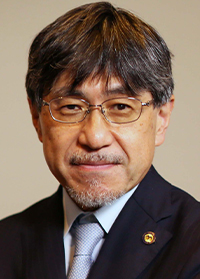Greetings from the Director

Akio Morita, the Director of Tokyo Rosai Hospital
Our hospital is stablished in May 1949, this year marks the 75th anniversary of the founding of our hospital. It is one of the oldest hospitals among the nationwide network of workers’ compensation hospitals operated by the Japan Organization of Occupational Health and Safety (JOHAS).
The original purpose of the hospital was to treat illnesses caused by industrial accidents in the surrounding Keihin industrial area, but as time has passed, the working environment has improved and the type of illnesses has changed. Today, the two main goals of our medical practice are “community medicine” to play a central role in local medical care, in addition to “medical care for workers,” which was our original main business.
-
-
Playing a central role in medical care for workers
-
Based on the philosophy of supporting the professional lives of working people from the aspect of medical care, we provide consistent, advanced, and specialized medical care from prevention to treatment, rehabilitation, and early return to work, thereby playing a role in labor policy.
Thorough preventive medical care is particularly important in medical care for workers, and in addition to physical examinations, brain scans, and general medical examinations, the hospital also provides special medical examinations related to workers’ compensation such as pneumoconiosis and asbestos.
Furthermore, our hospital has been a pioneer among medical institutions nationwide in providing “support for balancing treatment and work” programs. We support workers to receive treatment while continuing to work or to return to work after treatment. Currently, the hospital has a “Support Center for Balancing Treatment and Work” and plays a central role among workers’ compensation hospitals nationwide, especially with regard to cancer and mental health.
-
A general hospital trusted as the core of community healthcare
We provide safe, high-quality, and reliable medical care to the community. We focus on acute care, emergency care and cancer treatment. We have excellent medical staff and the latest medical equipment.
As a “Tokyo Metropolitan Government-designated secondary emergency medical institution,” the hospital provides emergency medical care around the clock. We can respond promptly to patients with time-sensitive strokes, cardiac diseases and any injuries. As a “Tokyo Metropolitan Government Cooperative Hospital for Cancer Treatment,” we focus on cancer treatment. In addition to advanced surgical treatment and anticancer drug treatment, we are also equipped with high-performance, high-precision radiotherapy equipment.
Designated as a “Community Medical Support Hospital” by the Tokyo Metropolitan Government, the hospital works in cooperation with neighboring medical institutions. We also operate a Community Comprehensive Care Unit to provide reliable medical service to facilitate home healthcare.
We are focusing on comprehensive community medical care in close collaboration with home medical care in order to adapt to the aging of society.
We will continue to play a role as a core facility that supports the health and medical care of local residents.
-
Disaster Base Hospital
We have been designated as a “Tokyo Metropolitan Disaster Base Hospital.” We will provide disaster medical services in cooperation with neighboring medical institutions. In the event of a major disaster such as the Noto Peninsula Earthquake happened on Jan. 1, 2024, the hospital has dispatched a DMAT team to provide medical support in emergency situations.
-
The closest general hospital to Haneda Airport
We provide medical treatment for domestic and international passengers in Haneda Airport. We will continue to actively accept patients from overseas in the future. We are also prepared to cooperate in the event of a disaster at the Haneda Airport.
The basic philosophy of our hospital is “a hospital where we can share the spark of life. We aim to improve and maintain the “radiance of life,” or health and life of patients, workers, and local residents. We also aim to “share the radiance of life” with all of our employees. Our goal is to protect the health and lives of our employees, and to create a hospital where they can enjoy their work, feel fulfilled, and take pride in their work.
We will continue to make every effort to serve the local medical community and workers, and we look forward to your continued support in the future.
Director’s Brief CV
- Mar 1982 Graduated from the University of Tokyo, School of Medicine, and began training at the Department of Neurosurgery, University of Tokyo, School of Medicine
- Apr 1989 Resident in Neurosurgery, Mayo Clinic, Minnesota, U.S.A.
- January 1996 Chief Resident, Mayo Clinic, Minnesota, U.S.A.
- Jun 1997 Lecturer, Department of Neurosurgery, George Washington University, Washington, DC, USA
- Sep 1998 Lecturer, Department of Neurosurgery, University of Tokyo
- May 2002 Assistant Professor, University of Tokyo
- Apr 2006 Chief, Department of Neurosurgery, NTT East Kanto Hospital
- Jan 2013 Professor, Graduate School of Neurosurgery, Nippon Medical School
- Apr 2019 Concurrently Dean, Graduate School of Medicine, Nippon Medical School
- Apr 2023 Professor Emeritus, Nippon Medical School, Director, Center for Geriatric Health and Medicine, Teraoka Memorial Hospital
- Apr 2024 Director, Tokyo Rosai Hospital
Specialties
Neurosurgery, brain tumors, cerebrovascular disorders


